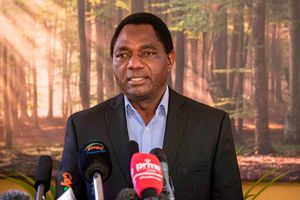
The debt restructuring negotiations have been held back by differences between China and Western creditors.
Zambia's historic agreement with private creditors to restructure a $3.5 billion Eurobond has put the southern African country's long-sought debt resolution back on track, observers say.
Either that, or it may only delay a bigger blow in the future.
President Hakainde Hichilema announced this week that an agreement had been reached under the G20 Common Framework, removing a key hurdle in his government's push to restructure the country's $18.6bn foreign debt.
Debt restructuring negotiations have been held up by differences between China and Western creditors.
Zambia's finance minister, Situmbeko Musokotwane, described the agreement with Eurobond holders as "a major milestone that everyone has been looking forward to".
The new deal will see bond holders forgoing about $840 million of their claims compared to $700 million under the initial agreement that was reached in November last year, but was rejected by China.
Bond holders also agreed to extend payment dates and provide payment relief, which will enable Zambia to continue receiving funds under a $1.3 billion International Monetary Fund (IMF) programme.
Analysts believe the agreement will provide more debt relief compared to the one rejected by China last year on the grounds that it favoured private investors. China is Zambia’s single biggest creditor.
The World Bank said the new deal “meets comparability of treatment requirements” and was a major milestone for Zambia towards restoring debt sustainability.
“The World Bank welcomes the agreement between the government of the Republic of Zambia and bondholders on the terms for restructuring Zambia’s Eurobonds,” the World Bank said in a statement.
“This follows the agreement Zambia reached in 2023 with the official bilateral creditors.
“The Official Creditor Committee has confirmed that the agreement meets comparability of treatment requirements.
“The terms are consistent with the parameters of the Joint World Bank-International Monetary Fund Debt Sustainability Framework.
“To finalise the debt restructuring process, other commercial creditors must now agree to restructure debt on terms that are comparable to those offered by bondholders and official bilateral creditors.
“Zambia’s agreement on the terms of debt restructuring with Eurobond holders represents a critical milestone toward restoring debt sustainability.”
The Bretton Woods institution said the completion of negotiations with other commercial creditors will bring a final resolution to Zambia’s debt crisis.
“This will help Zambia attract new investments, accelerate growth, generate jobs, and respond to urgent priorities, such as the ongoing drought,” it added.
Zambia’s next hurdle in its efforts to move from debt distress is to agree terms with commercial creditors that include two Chinses state-owned banks.
Lusaka owed the China Development Bank $469 million as of June 2023 and the China Industrial Commercial Bank of China $461 million.
Delays in reaching an agreement with Chinese creditors, who are mainly state owned, is one of the major reasons why Zambia has been struggling to finalise its debt restructuring.
“It is unclear how close Zambia is to reaching a deal with other commercial creditors,” said Patrick Curran, a senior economist at Tellimer Research.
“I would not discount the risk of further delays, given we are three and half years on from default,” Mr Curran added.
Observers said Zambia’s deal could give hope to other African countries that are clamouring for debt restructuring.
Ghana is one of the countries engaged in official negotiations with its bondholders for potential restructuring of its huge pile of Eurobonds.
“We will see how Zambia does it in the next three to five years,” an analyst told Global Capital. “There is optimism, but maybe Zambia is back here again.”
The Rane Network, a geopolitics intelligence solutions provider, said the eurobond agreement did not only provide a glimmer of hope to the Zambian economy, but also gave confidence to countries such as Ghana and Ethiopia who are engaged in debt restructuring talks.
“Following Zambia’s agreement with eurobond holders, a deal with commercial lenders is the only outstanding agreement Zambia must reach to secure compliance with its $1.3 billion International Monetary Fund relief programme,” the Rane Network said in its analysis of the deal.
“The Eurobond agreement will also buttress investor confidence in Zambia, potentially materialising through an increase in foreign investments as well as strengthening of the kwacha, the country’s national currency.
“More broadly, the March 25 agreement marks the first success of the G20 Common Framework, suggesting that Ghana and Ethiopia could also make further progress regarding debt restructuring talks under the framework in the coming months.”
Zambia acquired most of the Chinese loans during the reign of former president Edgar Lungu whose government embarked on massive infrastructure projects that were bankrolled by Beijing.
In 2020, Zambia became the first African country to default on its debt repayments during the Covid-19 era.
President Hichilema, who took over from Mr Lungu in 2021, has been pushing creditors such as China and Eurobond holders to restructure Zambia’s external debt to help kick-start the country’s copper reliant economy.
Soon after coming into power he cancelled $1.6 billion yet to be disbursed loans from the China Exim Bank and Industrial Commercial Bank of China as one of the steps to help Zambia manage its debt overhang.
The cancellation of the loans forced the country to halt the construction of several roads, highways and information and technology projects funded by Chinese lenders.







